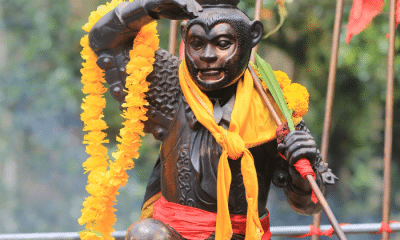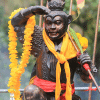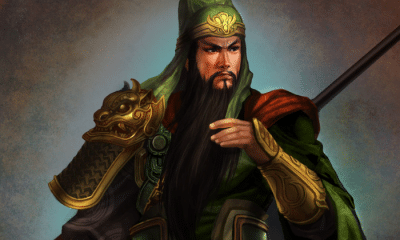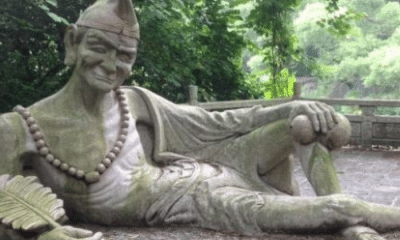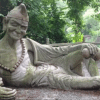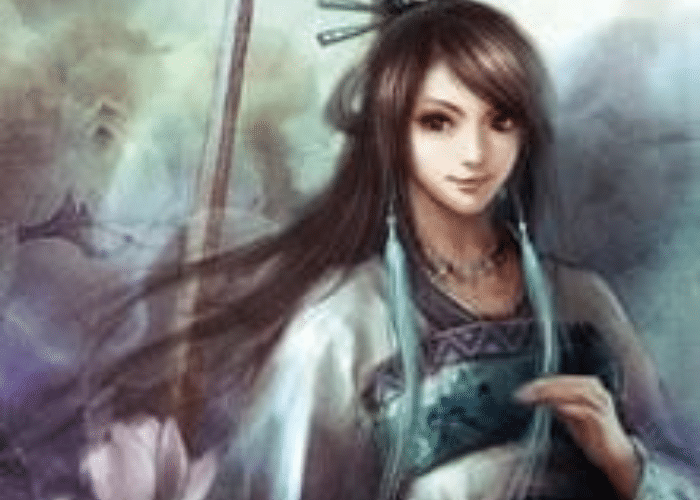
Chinese
Jiutian Xuannu: The Dark Lady of Chinese Mythology
Jiutian Xuannu: The Dark Lady of Chinese Mythology
Jiutian Xuannu is a goddess of mystery and magic. Keep reading to learn more about one of China’s most controversial goddesses!
Deities associated with warfare are often noted for their physical prowess and feats of strength. They are powerful individuals who are skilled in the use of weapons.
Some deities, however, wage war in a different way. They use their intelligence and magic to overpower their enemies and support their allies.
In China, one such goddess is Jiutian Xuannu. She is most noted for her relationship with the Yellow Emperor, who she guided to victory over his greatest opponent.
Xuannu was also a goddess of sexuality. The feminine powers she used in battle viewed sexually in earlier traditions, putting her at odds with later Chinese culture.
Despite this, Jiutian Xuanna remained an influential goddess in Chinese religion. From her origins as an ancient deity, she became one of the great protectors of Taoist China.
The Roles of Jiutian Xuannu
Jiutian Xuannu is attested in early sources simply as Xuannu, usually translated as “The Dark Lady” or “The Lady of Mystery.” The title Jiutian, “Of the Nine Heavens,” was added after her assimilation into Taoist belief.
The first account of Jiutian Xuannu was written in the 9th century. It claimed that she was the teacher of Huangdi, the Yellow Emperor.
Jiutian Xuannu appeared to Huangdi during his conflict with Chiyou. Trapped in a thick mist conjured by his enemy, the Yellow Emperor asked for his teacher’s advice.
She appeared to him on the back of a phoenix, using clouds as reins. She gave him several magical texts and amulets to help him defend his people and overpower Chiyou.
Because of Jiutian Xuannu’s aid, the Yellow Emperor defeated his enemies and cemented his authority over China. He became an immortal as a result.
By providing this aid, Jiutian Xuannu established herself as a goddess of warfare, particularly of martial magic.
Stories grew that the goddess possessed great powers in warfare that she could pass on to her followers in times of need. She could make herself invisible and grant longevity by influencing a man’s breath.
One of Jiutian Xuannu’s greatest powers was the ability to manipulate the stars. She once protected the state by moving the stars of the Big Dipper, making them warriors who would defend China.
Jiutian Xuannu had a group of acolytes, the Six Ding Jade Maidens, to whom she taught her powers. Each performed a specific act of concealment on her behalf.
The Six Ding Jade Maidens could conceal not only a person’s physical body, but the different parts of their soul and spirit as well. Two of them could conceal fate and destiny.
When those who won Jiutian Xuannu’s favor were influenced by these powers, they became invisible to anyone who wished them harm. Both mortal enemies and supernatural sources of evil could be averted through her magic.
While most references to Jiutian Xuannu concern the use of her powers in warfare, the Dark Lady was also a goddess of sexuality. The same magic that she used in battle could be used in sexual practices because, as one handbook claimed, they could bring either life or death depending on whether the correct methods were used.
My Modern Interpretation
Although the written stories of Jiutian Xuannu included Taoist characters and doctrine, she emerged long before this philosophy became prominent in China.
Historians believe that Xuannu was a goddess of early China. Before any connection was made to Taoist philosophy, she was an archaic goddess of war and sexuality.
Some have compared her to the Morrigan in Irish mythology, although the two have no cultural connection. Both were mysterious female figures who could magically influence the course of battle and often used their sexuality in addition to martial prowess.
By the Han Dynasty, however, Xuannu’s importance had diminished. Both her sexuality and her role as a female deity of warfare put her at odds with the values of Han culture.
As she was assimilated into Taoism, different means were used to make her fit into the social structure and virtues of the culture.
Some traditions elevated her as an immortal who used magic and intelligence, rather than simple force, to win battles. Elements of her story that did not fit this image, such as her sexuality, were changed to make her a life-giver.
Others, however, sought to expunge the goddess’s erotic nature entirely. References to sexuality in Xuannu’s stories remained a contentious topic.
It was not until the 15th century AD that Jiutian Xuannu came to be truly honored as a protectress of China and its rulers.
In 1493, Empress Zhang was officially ordained as the first and only empress in China’s history to rule alongside her husband as his only wife. Her position was unique.
In her ordination scroll, Jiutian Xuannu was named as the head of all celestial generals and soldiers. She was positioned as one of the country’s foremost divine protectors who was capable of “slaying evil and restoring righteousness.”
Empress Zhang and the other members of the Ming Dynasty promoted Jiutian Xuannu as a guardian of China and advisor to its emperors. Perhaps to reflect the position of the Empress, Xuannu’s femininity was highlighted.
Xuannu and her acolytes were seen as embodiments of the feminine element yin. While they did not have the masculine power, yang, to fight battles and rule as warriors, they had the cunning, intelligence, and magical powers to win through other means.
Some historians believe that Jiutian Xuannu was invoked in the Ming era not to win in warfare, but in political maneuverings.
Empress Zhang invoked Jiutian Xuannu in the same way that male members of the dynasty invoked Xuanwu, a male god of magic. Both were powerful Taoist deities who were not assimilated into other Chinese philosophies.
The violence and sexuality of Xuannu had been at odds with early Taoist philosophy, but they were even more contrary to Buddhist teachings. Unlike some other deities, she was never syncretized into Buddhism.
During the Ming Dynasty, two families at court formed factions that vied for power. While the Zhang family were Taoists, the Zhous followed Buddhist teachings.
By associating imperial power and China’s wellbeing with distinctly Taoist deities, the Zhangs positioned their own beliefs above those of their rivals. The implication was that only followers of the Taoist gods could ensure the aid of gods like Jiutian Xuannu to protect China.
In Summary
Jiutian Xuannu, “The Mysterious Lady of the Nine Heavens,” is a goddess of war and sexuality in Taoism.
She originated as a war deity before the development of Taoist philosophy. At odds with many of the values taught by Laozi, her character and powers were changed to better fit Han culture.
Her most famous appearance in Taoist legends is as a teacher of the Yellow Emperor. Through her magical gifts, he was able to defeat an enemy that could not be fought with physical power alone.
Her use of magic and cunning in warfare embodied the yin element of the feminine. She and her acolytes, the Six Jade Ding Maidens, used powers of concealment to protect their followers and confuse their enemies rather than the brute strength associated with masculine fighting.
While her association with sexuality decreased through Chinese history, she was still associated with sexual acts and knowledge. This is one of the reasons she was never assimilated into Chinese Buddhism.
Her identification as a Taoist goddess is likely one of the reasons she was cast in the Ming era as a protectress of the nation and commander of the forces of heaven. To weaken their Buddhist political rivals, the family of Empress Zhang promoted Taoist deities as China’s true guardians.


